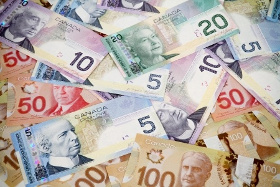The Canadian dollar fell today after Canada’s GDP data turned out to be disappointing. The currency swiftly reversed its movement, though, trimming losses against some rivals, while erasing them outright against others. The loonie even managed to gain on the euro, which felt pressure from slowing eurozone inflation.
Statistic Canada reported that gross domestic product fell 0.1% in September from the previous month — the first decline after seven consecutive months of growth. Analysts had expected the same 0.1% increase as in August. Economists speculated that the underwhelming data can prevent the Bank of Canada from raising interest rates in December.
The Raw Materials Price Index dropped 2.4% in October, mostly due to lower crude oil prices, almost two times less than experts had predicted — 5.2%. The Industrial Product Price Index rose 0.2%, whereas specialists had forecast a decline by 0.5%.
Meanwhile, Eurostat reported that eurozone inflation slowed to 2.0% in November from 2.2% in October. The actual value was below the consensus forecast of 2.1%.
USD/CAD gained from 1.3282 to 1.3313 as of 16:29 GMT today, touching the high of 1.3333 intraday. EUR/CAD dropped from 1.5126 to 1.5070. CAD/JPY slipped from 85.40 to 85.30.
If you have any questions, comments or opinions regarding the Canadian Dollar,
feel free to post them using the commentary form below.

Canadian Dollar Falls After GDP Miss, Reverses Losses Later
More from NewsMore posts in News »


Be First to Comment